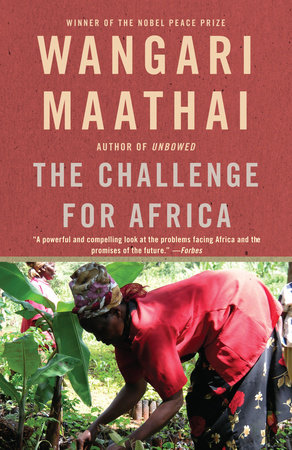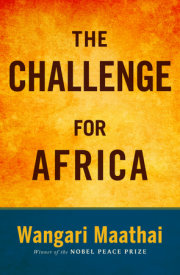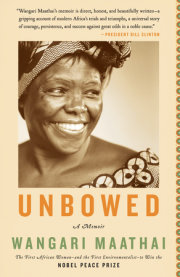One The Farmer of Yaoundé
THE CHALLENGES Africa faces today are real and vast. Just as I began work on this book, my own country of Kenya was plunged into a pointless and violent postelection political conflict and humanitarian crisis that claimed more than a thousand lives and left hundreds of thousands homeless. As I write, internecine fighting still wracks the Darfur region of Sudan, Chad, southern Somalia, the Niger Delta, and eastern Congo. Zimbabwe’s most recent election was marred by violence and a failure to tally the vote properly and reach a negotiated political settlement. Meanwhile, a series of violent attacks in South Africa against immigrants from other African countries left more than forty dead and forced tens of thousands to flee from their homes. South Africa, a political and economic beacon in the region, appeared in peril of facing the conflicts many other African nations have experienced.
Drought and floods affect many countries in both western and eastern Africa. Natural resources are still being coveted and extracted by powers outside the region with little regard for the long-term health of the environment or poverty reduction; desertification and deforestation, through logging and slash-and-burn agriculture, are decimating species, water supplies, grazing grounds, and farmland, and contributing to recurring food emergencies. Shifting rainfall patterns, partly as a result of global climate change, directly threaten the livelihoods of the majority of Africans who still rely on the land for their basic needs. At the same time, sub-Saharan African countries are falling short of the benchmarks for health, education, gender equality, and environmental sustainability, which are among the eight Millennium Development Goals agreed on by the United Nations in 2000.
Although poverty rates in Africa have declined over the past decade, they remain stubbornly high. HIV/AIDS, malaria, and tuberculosis—all preventable diseases—still take too many lives. In sub-Saharan Africa, one in six children dies before his fifth birthday, comprising fully half of the world’s child deaths. Conflicts ravage too many communities as rival groups vie for political and economic power. And the importance of Africans’ cultural heritage to their own sense of themselves still isn’t sufficiently recognized.
Nevertheless, in the half century since most African countries achieved independence and in the nearly two decades since the end of the Cold War, the continent has moved forward in some critical areas of governance and economic development. More African countries have democratic forms of governance, and more Africans are being educated. Debt relief has been granted to a number of African states, and international trade policies are now subject to greater scrutiny to assess their fairness, or lack of it. South Africa has made a successful, and peaceful, transition to full democracy from the time of apartheid. In 2002, Kenya held its first genuinely representative elections in a generation. Decades-long civil wars in Angola and Mozambique have ended. Liberia has emerged from a devastating series of internal and regional conflicts. In 2005, it elected to the presidency Ellen Johnson-Sirleaf, the first woman to head a modern African state, and the process of reconciliation and reconstruction is under way. Rwanda, a decade and a half after the 1994 genocide, has a growing economy, and Rwandan women constitute almost half of its parliament, the highest percentage in the world.
After decades of dictatorship, instability, and extreme poverty, and a conflict that has claimed upward of five million lives, in 2006 the Democratic Republic of the Congo held elections overseen by the United Nations that were judged largely free and fair. A fragile peace holds between northern and southern Sudan, and efforts continue to bring an end to the civil war in northern Uganda. Since the early years of this cen- tury, a number of African economies have grown at more than 5 percent a year (and some at twice this rate), and African civil society—nongovernmental organizations, trade unions, civic associations, community-based groups, and ordinary citizens—is becoming bolder in speaking out in support of human rights and good governance. These are real achievements, and they belie the idea that Africans cannot take charge of their own affairs.
Of course, throughout the continent there are instances where forward motion and stasis are occurring simultane-ously: efforts to battle corruption have been waged, but often incompletely; principled and visionary leaders are still too few in number; and while the world increasingly recognizes that Africa will be hit hard by climate change, the transfer of “green” technology from industrialized nations to the continent is slow, and forests in Africa continue to shrink.
MOVING BEYOND SUBSISTENCE
One morning in early September 2007, I stepped through the front door of my hotel in Yaoundé, the capital of Cameroon. I was there because the ten governments of Central Africa had appointed me the Goodwill Ambassador for the Congo Basin Forest Ecosystem in 2005, and I had come to familiarize myself with the secretariat of the Congo Basin Forest Partnership (CBFP) and the Commission for the Forests of Central Africa (COMIFAC), headquartered in Yaoundé, and to meet the governments’ ministers responsible for the economy and management of the forests.
Yaoundé is a metropolis whose 1.4 million people live among seven hills between the Nyong and Sanaga rivers in the south-central part of the country. The hotel was beautiful, modern, and clean; its location was similarly attractive, perched on one of those hills overlooking the city, with a view of Mount Cameroon, West Africa’s tallest peak.
As I stood outside, I happened to look across from the hotel and saw a group of farmers on one of the hills, which was covered in thick vegetation except where the few men and women were working. It looked like they had planted a few banana and what appeared to be cassava trees, and were preparing the ground for more crops. As a light rain fell, I noticed that the farmers were making small depressions in the soil and then molding it into rows that were parallel to the gradient of the hill. I thought to myself,
Those people should not be working on such a steep slope, because they are very quickly going to lose all that soil when it rains. Anxiously, I turned to ask the guards at the gate of my hotel why one of these farmers—a woman on whom my eyes had settled—was cutting the furrows downward, instead of against the gradient. “That way, when the rains come the water will run along the furrow and not disturb the crops,” one of the young men replied, without hesitating.
Seeing the women and men on the hillside in Yaoundé didn’t surprise me. Such a sight is not uncommon in many other cities and towns throughout the vast African continent. Whether it is in the middle of a big city like Yaoundé, Johannesburg, Dar es Salaam, or Nairobi, or in the countryside, the story is the same: slash and burn, plant, harvest once or twice, and move on to new land to repeat the same unsustainable process.
What amazed me, though, was the guard’s response, although it could have come from any African in any country south of the Sahara. Yet this method of farming directly contradicted every principle of soil and species conservation I knew. Instead of making furrows across the gradient of the hill so the rainwater would pool in the small depressions and sink into the ground, where it would replenish belowground reservoirs, this farmer was doing just the opposite. She was guaranteeing that the soil, one of her most precious natural resources and one she’d so carefully formed and so desperately needed to make her crops grow, would be swept down the hillside when the rains fell—in the very furrows she had just dug! Not only was the woman making it easier for what she had planted to be washed away; she was also creating the perfect environment for the erosion of precious topsoil and loss of rainwater, making it less likely that
anything would grow on the hillside in the future. And the hotel guards had no idea of the damage she was doing; they assumed that this was how farming was done. The tragedy is they are not alone.
I was struck by the irony of the situation. I was in Cameroon, a guest of the state, sleeping in a luxurious hotel and waiting for a car to take me to meetings to discuss how to safeguard the Congo Basin forests—an ecosystem of seven hundred thousand square miles in Central Africa. It is the second-largest intact expanse of forest in the world, after the Amazon rainforest, and is often referred to as the world’s “second lung.” I would be visiting government ministers, international donors, and officials of COMIFAC. All of us are charged with the responsibility of ensuring that the forests are sustainably managed for the benefit of everyone, including those subsistence farmers on the hill.
Whatever the outcome of our discussions, I knew one essential fact: no matter what else we were doing, unless those of us assembled at the COMIFAC headquarters could work with that farmer—multiplied by several million in Cameroon, and several million more in the ten countries of the Congo Basin region and, indeed, throughout Africa—not only would we not save the Congo forests, but we might also be unable to halt the rapid desertification under way across the continent.
Of course, the farmers I observed, and others like them, aren’t the primary threats to the Congo Basin forests. Mining and timber concessions that feed the seemingly insatiable global demand for raw materials, as well as residual conflict and ongoing illegal logging in the eastern part of the region, are more directly destructive. But once the timber trucks and mining companies have literally made their inroads into the forests and cleared the trees, it is people such as these farmers who follow. They carve out small plots and cut the remaining vegetation for charcoal or small-scale subsistence agriculture, engage in poaching and the trade in bush meat, and complete the destruction.
Often, the soil in tropical forests is not well suited to agriculture and can be farmed for only a few years. Unless the subsistence farmers practice good land management, the soil degrades quickly, and they are forced to encroach further into the forests and grasslands. When rains fall, the earth is washed into the rivers, leaving barren land behind. As the trees are cut, the landscape is transformed, and the risks of soil erosion and desertification increase. In this way, a cycle is set in motion that not only threatens the survival of the people who rely on the ecosystems’ resources—its watersheds and rainfall patterns, its flora and fauna—but also has the potential to endanger the climatic systems on which the entire planet depends.
Copyright © 2009 by Wangari Maathai. All rights reserved. No part of this excerpt may be reproduced or reprinted without permission in writing from the publisher.









